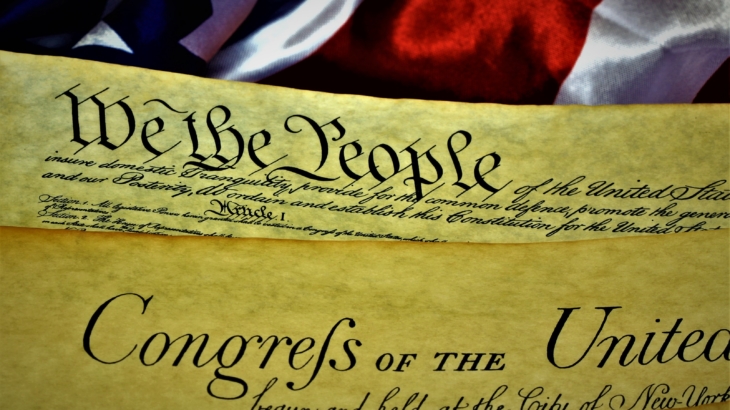Principle of Appropriate Role and Purpose of Government in Protecting Liberty of the Citizenry
 Essay Read by Constituting America Founder, Actress Janine Turner
Essay Read by Constituting America Founder, Actress Janine Turner
Since the earliest days of the American founding, a bedrock principle of our republic has been the concept that government is an essential element in protecting and preserving individual rights. In the Declaration of Independence, principal author Thomas Jefferson wrote, “to secure… rights, Governments are instituted among Men, deriving their just powers from the consent of the governed.”
Building on this precept, in Federalist 51, James Madison talked about the tension between the necessity of government in protecting individual rights, but the need for the governed to work to constrain the powers of government:
“If men were angels, no government would be necessary. If angels were to govern men, neither external nor internal controls on government would be necessary. In framing a government which is to be administered by men over men, the great difficulty lies in this: you must first enable the government to control the governed; and in the next place oblige it to control itself.”
Our republic is built on a simple, yet powerful, concept: we are endowed by our creator with certain “unalienable” rights. We cede small measures of those rights to government in the form of powers, in order for the full-measure of our rights to be protected.
This leads to a fundamental axiom: whenever government is enlarged, individual rights are diminished. You cannot reconcile liberty with anti-liberty.
This gives us not only the basic structure of the federal constitution, but most state-based constitutions as well. The Articles of the United States Constitution lay out the powers of government—i.e., what measure of rights we have ceded to the government in the form of powers. The first eight amendments within the Bill of Rights represent further constraints on those powers in order to protect individual rights.
But then the last two amendments in the Bill of Rights, Amendments 9 and 10, make further declarations regarding the balancing of rights versus the powers of government.
The Ninth Amendment makes it clear that the rights of citizens aren’t limited to what is “enumerated” in the Bill of Rights, that their rights are essentially infinite, while the Tenth Amendment underscores this idea that the powers of government are created by the people giving up some measure of their rights—and anything not “delegated” to government is “reserved” by the people.
Further, while a New Deal-era Supreme Court dismissed limitations on federal power in cases like US v. Darby, even that court had to admit that when it comes to the Tenth Amendment, it states, “a truism that all is retained which has not been surrendered.” US v. Darby, 312 US 100, 124 (1941)
This tension underscores the fundamental beauty of our system—we are not a pure democracy (something our founders were rightly skeptical of). As the saying goes, “democracy is two wolves and a sheep deciding what to have for supper.”
We recognize that while the people can vote to make particular laws, those laws can only exist within the powers the people have delegated to government and they cannot be violative of the rights retained by the people. So while one group of people, even a majority of the people, might demand that government impose restrictions on certain kinds of unpopular speech, the First Amendment makes it clear that such restrictions would be unconstitutional (and one can say that the entire purpose of the First Amendment is to protect “unpopular” speech. “Popular” speech requires no such protection!).
How, then, do we assess this balance between the rights of people and the powers of government?
It starts with a basic inquiry. All “just” law is born out of the intersection of the exercise of individual rights. One’s right to wave their hands around in a wild interpretative dance (the right to free expression) is limited the moment those hands cross the bridge of someone else’s nose, and violate their right to be secure in their person, free from harm. And when those rights come into conflict, it is the party that is more-aggrieved that the law is supposed to protect (and the law is supposed be more weighted on behalf of those less-able to advocate for themselves).
This presents our society with the need for “balancing tests” to determine where that line ought to be drawn: how is the right to free speech balanced against someone’s right to now be lied about (a harm to their reputation)? Or how is someone’s right not to be harmed by government’s force balanced against the rights of people in a community to not be harmed by that person’s violent actions?
When the public, either through legislation or via the courts, calls for a new law, a new balancing test, the Supreme Court has made it clear that such laws, such decisions, need to be made in a way to be the “least restrictive” way of achieving the government’s goals. This way the rights of the individual are still protected to the maximum extent possible.
While there remains considerable debate as to whether such balancing tests are a good thing, or whether there is harm in the long run from a series of ad hoc inquiries into that balance, in the end it is important to remember that the Constitution sets out essential bedrock principles in that regard. All that is not surrendered is retained, and we should remain vigilant each and every time we look to enlarge the power of government.
 Andrew Langer is President of the Institute for Liberty, as well as Chairman and Founder of the Institute for Regulatory Analysis and Engagement. IFL is a non-profit advocacy organization focused on advancing free-market and limited government principles into public policy at all levels. IRAE is a non-profit academic and activist organization whose mission is to examine regulations and regulatory proposals, assess their economic and societal impacts, and offer expert commentary in order to create better public policies. Andrew has been involved in free-market and limited-government causes for more than 25 years, has testified before Congress nearly two dozen times, spoken to audiences across the United States, and has taught at the collegiate level.
Andrew Langer is President of the Institute for Liberty, as well as Chairman and Founder of the Institute for Regulatory Analysis and Engagement. IFL is a non-profit advocacy organization focused on advancing free-market and limited government principles into public policy at all levels. IRAE is a non-profit academic and activist organization whose mission is to examine regulations and regulatory proposals, assess their economic and societal impacts, and offer expert commentary in order to create better public policies. Andrew has been involved in free-market and limited-government causes for more than 25 years, has testified before Congress nearly two dozen times, spoken to audiences across the United States, and has taught at the collegiate level.
A globally-recognized expert on the impact of regulation on business, Andrew is regularly called on to offer innovative solutions to the challenges of squaring public policy priorities with the impact and efficacy of those policies, as well as their unintended consequences. Prior to becoming President of IFL and founding IRAE, he was the principal regulatory affairs lobbyist for the National Federation of Independent Business, the nation’s largest small business association. As President of the Institute for Liberty, he became recognized as an expert on the Constitution, especially issues surrounding private property rights, free speech, abuse of power, and the concentration of power in the federal executive branch.
Andrew has had an extensive career in media—having appeared on television programs around the world. From 2017 to 2021, he hosted a highly-rated weekly program on WBAL NewsRadio 1090 in Baltimore (as well as serving as their principal fill-in host from 2011 until 2021), and has filled in for both nationally-syndicated and satellite radio programs. He also created and hosted several different podcasts—currently hosting Andrew and Jerry Save The World, with long-time colleague, Jerry Rogers.
He holds a Master’s Degree in Public Administration from Troy University and his degree from William & Mary is in International Relations.
Click here for First Principles of the American Founding 90-Day Study Schedule.
Click here to receive our Daily 90-Day Study Essay emailed directly to your inbox.




The reality that in the empirical history of man, thought the idealism of government enumeration has been a long and perilous journey of trials and tribulation. To advance the fundamental concept that for society to become civilized the power of the state, and the legislation they create, must to have any success, be enumerated preventing the tyranny and despotism of the state.
Enjoy your insights, and presentations. Of all the concepts lacking in the United States and the knowledge of the American citizen, and the knowledge of the world population in general is the fundamental concept that the icon of American is [FEA GOVERNMENT].
George Washington’s identification: Government is not reason, it is not eloquence, — it is force. Like fire it is a dangerous servant and a fearful master; never for a moment should it be left to irresponsible action.
Government without legislation authorized to enumerate the power of the state, is a dictatorship.